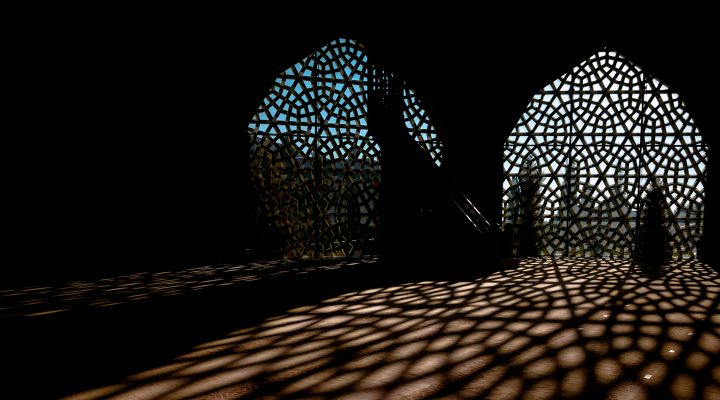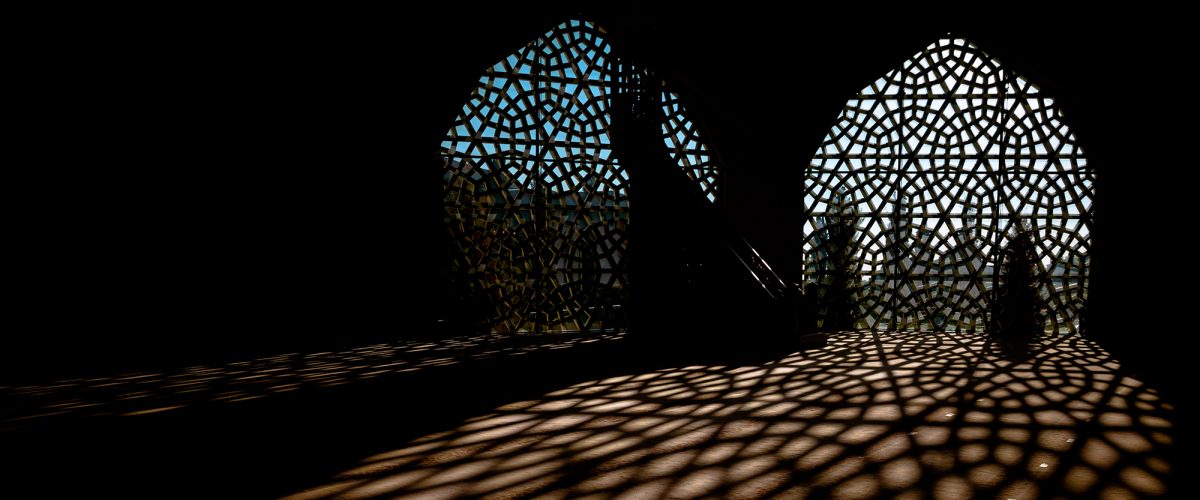Sunday evening, March 10, opened the Muslim holy month of Ramadan. Observed during the ninth month of the Muslim calendar every year, it is a period intended for self-denial, which enables more opportunity for prayer, reflection and devotion, according to The Oxford Dictionary of World Religions.
“Ramadan,” meaning “extreme heat” or “high summer,” does not always occur during the warm months of the year, since the lunar calendar “rotates backward 11 days each year in relation to the Gregorian solar calendar,” explains scholar of Islamic studies John Renard. That means while Ramadan began on March 10 this year, it will start on Feb. 28 in 2025.

Robert Sellers
World religionist Huston Smith notes in The Illustrated World’s Religions the reasons why Ramadan is so important. First, the revelation of the Qur’an (“recitation”) to Mohammad from the angel Gabriel began on the 27th day of the ninth month of the year 610 C.E. This initial revelation of scripture is known and celebrated by Muslims as the “Night of Power,” and many faithful followers will spend all night of the 27th in a local mosque praying and communing with Allah. Ten years after that first recitation of text to Muhammad — also during the ninth month — the leader with his followers began his migration from Mecca to Medina, where the Muslim Umma (“community”) began to consolidate.
During this holy season, all able-bodied Muslims — those “not ill or involved in crises like war or unavoidable journeys” — must deny themselves. As Smith writes: “From the first moment of dawn to the setting of the sun, neither food nor drink nor smoke passes their lips; nor are they sexually active.” A popular resource with a question-and-answer format adds: “Fasting also means refraining from negative attitudes and complaining, and developing a sense of solidarity with those who suffer from want all year long.” Smith clarifies that fasting “fosters compassion (on behalf of the suffering), for only the hungry know what hunger means.”
As Aminah McCloud, director of the Islamic World Studies Program at DePaul University, suggests: Fasting causes some difficulty for those who practice it for a month. “Alertness of mind and the ability to carry out our tasks” are compromised by the self-denial of Ramadan. This is especially true when the fasting month falls during the extreme heat of summer, or when Muslims who want to be faithful have occupations or life circumstances that make fasting especially demanding. McCloud, a Muslim American, also says fasting often is challenging for students when their public school teachers or administrators may question whether fasting is a legitimate religious duty.
Sixteen years ago, while helping to plan the first National Baptist-Muslim Dialogue, I attended the annual national convention of the Islamic Society of North America. I joined 30,000 Muslim individuals and families and about seven Baptist leaders for the conference in Ohio in 2008. Here is an adapted version of what I wrote for Good Faith Media following that experience.
Monday morning, Sept. 1, I prepared to leave my hotel in Columbus, Ohio, before daybreak. The weekend at the annual convention of ISNA had been eventful and instructive. Not really expecting there to be anyone or any food in the hotel’s breakfast room at such an early hour, I was amazed to enter a crowded elevator and emerge into a busy lobby and noisy dining area.
Suddenly, the situation made perfect sense when I realized the first day of Ramadan was beginning that very dawn. Muslim families, friends and new acquaintances sat talking quietly together, having already completed their early morning prayer and meal before dawn. Their devotion to the disciplines of Ramadan was very impressive.
“Ramadan is a mark of pride and also an unofficial rite of passage when children first observe its self-denial.”
Ramadan is a mark of pride and also an unofficial rite of passage when children first observe its self-denial, a practice that may begin at any time from age 8 to 15, depending on the culture. So, there were many children in the breakfast room, proudly sitting with parents and having their only food and drink until they would break their fast after sunset.
Fasting is the fourth of the Five Pillars, or observances, of Islam. The first is the confession, “There is no god but God and Muhammad is his messenger.” The second pillar is prayer, performed five times a day, at dawn, noon, mid-afternoon, evening and night while facing the holy city of Mecca. The third pillar is giving alms to the poor — that required by law, assessed at one-40th of one’s income, and that which is voluntary, often donated at the mosque on Fridays. The fifth pillar is the pilgrimage to Mecca, incumbent upon all able Muslims at least once in their lifetime.
Whereas the confession of faith is intended to be perpetually on the lips and heart, prayer is practiced multiple times per day. Almsgiving is often done weekly, and the pilgrimage is a once-in-a-lifetime experience for those who can undertake it. Fasting, however, comes around every year and lasts an entire month. Some would say that is why Ramadan represents personal sacrifice.
I rode to the Columbus airport from my hotel with two Muslim men — the elderly shuttle driver and a young physician from Baltimore. Both men were observing Ramadan.
The internist was hurrying to catch a flight back to Johns Hopkins hospital in time for the beginning of his 36-hour duty cycle, during which he would constantly be on call, make rounds, see patients and their families, and do follow-up with his patients. He admitted that the demands of his residency gave him little opportunity for sleep during his long shift, so keeping Ramadan was a real effort, but a spiritual requirement of Islam (“submission”) to which he, as a Muslim (“one who submits”) was willing to practice. He pointed out that due to Ramadan’s falling late in the summer that calendar year, the days were even longer and the sacrifice just a bit harder.
The taxi driver was not as astute in his explanations, but he equally expressed his commitment to fast because that is what Muslims do. With no real theological sophistication, he nonetheless noted that Ramadan helps him think more about the one God. A chance for spiritual reflection is, indeed, an obligation during Ramadan, when people can focus not on the satisfaction of their basic drives but on the blessings Allah provides. Perhaps that explains why the ISNA convention theme in 2008 when it coincided with the ninth month was “Ramadan: A Time for Change.” Significantly, the fast month allows each Muslim the space and time for making a change, not only in behavior, but in attitude, commitment, and spiritual awareness.
“With no real theological sophistication, he nonetheless noted that Ramadan helps him think more about the one God.”
Ramadan ends with Eid al-Fitr (“festival marking the end of the fasting month”). It is a wonderful time for family celebrations, gift exchanges, visits to elderly relatives, shared feasts, gathering with friends in one another’s homes and special prayers offered in the mosque.
For more than two decades, my family and I lived in the largest Muslim nation in the world — Indonesia. Year after year, we observed our Muslim friends and neighbors submitting to the rigors of Ramadan so they might draw closer to Allah. And, year after year, we also saw the anticipation and excitement that built throughout the month culminating in Eid al-Fitr, when in homes all around us families and friends traveled to visit family, or gathered with friends, to express their gratitude for being Muslim and their joy in another year of successfully keeping this beloved Pillar of their faith.
When missionary friends of ours lived and served in the Muslim city of Bukittinggi, West Sumatra, they fasted during Ramadan as a way of identifying with their neighbors, strengthening friendships and initiating conversations with strangers.
This year, 2024, Ramadan is being observed during the Christian Lenten season. Many Christians sacrifice something they enjoy experiencing or doing for Lent — the 40 days between Ash Wednesday and Easter, omitting Saturdays and Sundays. The 40 days of the Lenten season are a commemoration of the fasts of the lawgiver Moses, the prophet Elijah and the Savior Jesus. Denying oneself during the weeks of Lent is intended to bring “heightened awareness of the need for spiritual conversion and dependency on God.”
If you are a Christian observing Lent this holy season, remember as you give up chocolate, soft drinks, movies or other favorite treats that our spiritual siblings — the more than 1.8 billion Muslims in the world who, like Christians and Jews, claim Abraham as their father — are also being challenged this month to deny themselves as a form of spiritual discipline.
May their example inspire us to similar acts of devotion, contemplation and self-sacrifice, even when it is inconvenient or difficult.
Rob Sellers is professor of theology and missions emeritus at Hardin-Simmons University’s Logsdon Seminary in Abilene, Texas. He is a past chair of the board of the Parliament of the World’s Religions in Chicago. He and his wife, Janie, served a quarter century as missionary teachers in Indonesia. They have two children and five grandchildren.


